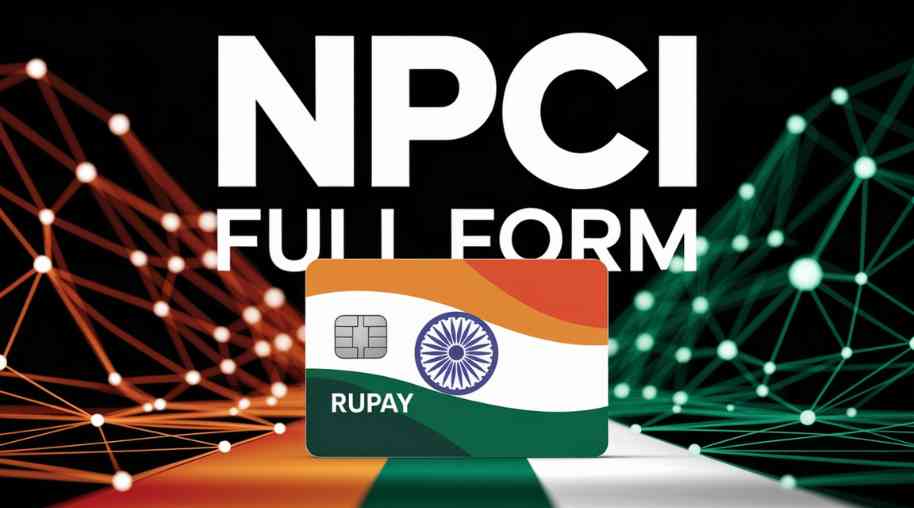NPCI Full Form-National Payments Corporation of India
by Shashi Gaherwar
0 1015
National Payments Corporation of India (NPCI): Transforming Digital Payments in India
The National Payments Corporation of India (NPCI) is a pivotal organization driving the transformation of digital payments in India. Established to develop and oversee the country’s retail payment and settlement systems, NPCI has revolutionized financial transactions, making them more efficient, secure, and accessible. From Unified Payments Interface (UPI) to RuPay, NPCI has introduced groundbreaking payment solutions that have enhanced financial inclusion and digital adoption. This article explores NPCI’s origins, key initiatives, impact, and future prospects. 
Origins and Objectives of NPCI
NPCI was founded in 2008 as a not-for-profit organization under the guidance of the Reserve Bank of India (RBI) and the Indian Banks’ Association (IBA). Its primary objectives include:
• Developing a robust payment infrastructure to support seamless digital transactions.
• Enhancing financial inclusion by enabling secure and accessible payment options for all citizens.
• Promoting interoperability among banks and payment platforms.
• Encouraging cashless transactions to support India’s vision of a digital economy.
NPCI was created as a response to the growing need for an efficient and unified payment system in India, ensuring that banking services reach even the remotest parts of the country.
Key Initiatives by NPCI
NPCI has launched multiple payment platforms and services that have transformed the Indian financial landscape. Below are some of its most significant initiatives:
1. Unified Payments Interface (UPI)
UPI is one of NPCI’s most successful innovations, enabling instant money transfers between bank accounts using a mobile number or Virtual Payment Address (VPA). Features such as QR-based payments, peer-to-peer transfers, and merchant transactions have made UPI the backbone of India’s digital economy.
2. RuPay Card
RuPay, India’s domestic card payment network, competes with international giants like Visa and MasterCard. It offers debit, credit, and prepaid cards with lower transaction costs, making digital payments more affordable and accessible for Indian consumers.
3. Immediate Payment Service (IMPS)
IMPS is a real-time interbank electronic funds transfer service that allows customers to make instant transactions 24/7. Unlike traditional NEFT transfers, which operate in batches, IMPS ensures quick and seamless money movement.
4. Bharat Bill Payment System (BBPS)
BBPS is a one-stop platform for bill payments, allowing consumers to pay utility bills, DTH subscriptions, loan EMIs, and more through various channels, including mobile banking, ATMs, and digital wallets.
5. Aadhaar Enabled Payment System (AePS)
AePS allows users to conduct banking transactions using their Aadhaar number and biometric authentication. This service has significantly boosted financial inclusion by enabling rural and semi-urban populations to access banking services without needing physical bank branches.
6. National Electronic Toll Collection (NETC)
NETC enables automatic toll payments using FASTag technology, reducing congestion and improving efficiency at toll plazas across India.
Impact of NPCI on the Indian Economy
NPCI’s initiatives have had a transformative impact on India’s financial ecosystem in several ways:
1. Increased Financial Inclusion
By introducing services like UPI and AePS, NPCI has empowered millions of unbanked and underbanked citizens, ensuring broader financial participation.
2. Growth of Digital Payments
The rapid adoption of UPI and RuPay has significantly reduced reliance on cash transactions, making digital payments the norm across urban and rural India.
3. Reduction in Transaction Costs
NPCI’s domestic payment solutions, particularly RuPay, have lowered transaction fees for banks and merchants, making electronic payments more cost-effective.
4. Enhanced Security and Fraud Prevention
With stringent security protocols, NPCI ensures safe and secure transactions, reducing instances of fraud and unauthorized access in the payment ecosystem.
5. Boost to E-commerce and Retail
Seamless and secure payment solutions like UPI and BBPS have accelerated the growth of online shopping, digital services, and retail transactions.
Challenges Faced by NPCI
Despite its success, NPCI faces several challenges that need to be addressed:
1. Cybersecurity Threats
With the growing adoption of digital payments, cyber threats and fraud risks have increased, necessitating continuous advancements in security frameworks.
2. Infrastructure and Connectivity Issues
Rural areas still face connectivity challenges, affecting the smooth operation of NPCI services, particularly AePS and UPI transactions.
3. Competition from Global Players
While NPCI has established dominance, international payment giants like Visa, Mastercard, and new fintech startups continue to pose competition.
4. Regulatory Compliance
NPCI operates under the supervision of the RBI and must continuously adapt to regulatory changes, which can sometimes slow down innovation.
Future Prospects of NPCI
Looking ahead, NPCI is focused on expanding its reach and innovating new solutions to further enhance India’s digital payments landscape. Some key future initiatives include:
1. Global Expansion of UPI and RuPay
NPCI is collaborating with international partners to expand the use of UPI and RuPay in foreign markets, allowing Indians traveling abroad to make seamless digital transactions.
2. Strengthening AI and Blockchain in Payments
Leveraging artificial intelligence (AI) and blockchain technology can enhance security, fraud detection, and transaction efficiency.
3. Boosting Rural and MSME Adoption
NPCI aims to bring more rural businesses and micro, small, and medium enterprises (MSMEs) into the digital payments ecosystem through tailored solutions.
4. Advancing Contactless Payment Solutions
With the increasing demand for faster and safer transactions, NPCI is working on strengthening contactless payment methods, including NFC-based solutions.
The National Payments Corporation of India (NPCI) has played a crucial role in India’s digital revolution by introducing cutting-edge payment solutions that enhance financial inclusion, economic growth, and transaction efficiency. With innovations like UPI, RuPay, and AePS, NPCI has established itself as a global leader in digital payments. As India moves towards a cashless economy, NPCI’s continued efforts in innovation and security will be key to ensuring a seamless and inclusive financial future for all.

Share:








Comments
Waiting for your comments